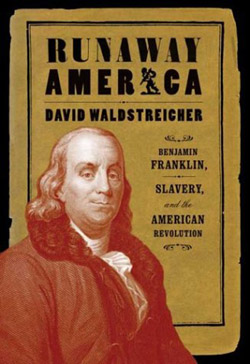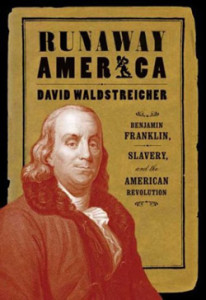Benjamin Franklin, Slavery, and the Founders: On the dangers of reading backwards


Alan Taylor has remarked upon a certain trend in the recent profusion of books on the Founders. As the reputations of some, like John Adams, are raised, others are condemned. History becomes a parody of Wall Street: a bull market for Hamilton means it is time to sell your stock in Thomas Jefferson.
When the controversial matter of slavery in the nation’s past is added to the mix, the results can be still more dubious. Recently we have seen the emergence of Benjamin Franklin, champion of freedom, and opponent of all forms of slavery. Or rather the reemergence, since this view was first advanced by the aging Franklin himself, spread vigorously by nineteenth-century abolitionists eager to ennoble their struggle by associating it with the Revolution, and kept alive by progressive and African American scholars, such as W. E. B. DuBois, in the early twentieth century.
Oddly enough, the antislavery Franklin is claimed not only by both sides of the slavery-and-the-Founders debate, but also by those who, wisely enough, try to mediate between them. Joseph J. Ellis, for example, emphasized the bad faith of Thomas Jefferson and James Madison on slavery only to hold up Franklin’s antislavery credentials—his presidency of the Pennsylvania Abolition Society in 1787 and his prominent signature on a petition presented to the first Federal Congress—as the jewel in the Founders’ crown. Meanwhile, the most forthright recent critic of the Founders on the slavery question justified his harsh judgment of Jefferson in light of the fact that Franklin “believed in racial equality.” A prominent scholar of race and the law in U.S. history argued, in an op-ed piece, against the erasure of history involved in a New Orleans school’s decision to give up the name of George Washington because he owned slaves. It is important to remember, she wrote, that Washington had a better record on slavery than Jefferson, adding that “some contemporaries of Washington like Benjamin Franklin and John Quincy Adams were against slavery and did not own slaves.”
When the views of Franklin of the 1780s, Washington of the 1790s, and John Quincy Adams of the 1830s are all conflated to oppose a timeless Jefferson on the question of slavery, the notion of Founders and foundings departs history and enters the realm of myth. Certainly the notion of a founding “generation” means very little if it stretches the entire fifty-nine years from the Declaration of Independence to the Amistadcase. And, in what seems a curious sort of founding grandfather complex, what matters most is what great men did in their old age when they were already known to be great.
Beneath the mythologizing, however, the story of Franklin and slavery is considerably more complex. Indeed, one could argue that Jefferson did more to undermine slavery during the era of the American Revolution than did Franklin. While the Pennsylvanian was busy blaming the British for slavery, the Virginian pushed for the end of the international slave trade and gradual emancipation in Virginia and almost succeeded in closing the Northwest territories to slave owners. Insofar as they acted as contemporaries, Franklin and Jefferson converged in the writing of the original draft Declaration, with its simultaneous indictment of slavery, blame of England, and outrage at the king’s enlistment of slaves.
Events after 1776, of course, do matter, as do the final acts of great lives. Franklin lived just long enough for his slaves to run away and die off, and for antislavery to become politically safe in his home state. By 1776, indeed, Franklin had become the point man defending the American patriots against accusations like those of Dr. Johnson, who asked pointedly, “How is it that we hear the loudest yelps for liberty among the drivers of negroes?” Franklin could hardly afford not to seem at least theoretically antislavery when he went to France and sought to depict the new United States as a land of freedom, charming the philosophes who were straining at the restrictions of the old regime. He did not so much experience a sea change in his attitudes as he managed to deflect the blame, deflecting criticisms of the Americans as slavemongers into a critique of colonialism British style, establishing a common ground in favor of liberty—and the American cause.
It is harder to see Franklin as part of an antislavery vanguard either before or after Independence when we realize how much he was responding to the initiatives of others, for other purposes. In this, actually, he was quite consistent. Antislavery gained real, if minority, support long before the Declaration of Independence or even the Stamp Act protests. In the colonies, it became a public issue during Franklin’s youth in Boston in the first quarter of the eighteenth century, and during his young adulthood in Philadelphia in the following decade. By the 1760s, Franklin’s contemporaries at home and in England and France were well aware of the similarities between colonists’ claims to liberty and those made by and on behalf of slaves. The slavery issue itself became inseparable from the debate over the governance, and liberties, of the American colonists. The American revolutionists and their leaders—most notably, Benjamin Franklin—often worked to stave off criticisms of the institution, for they rightly perceived criticism of slavery as attacks on themselves, their way of life, and their campaigns for freedom.
Franklin’s antislavery credentials have been, at the very least, remembered backwards. At most, they have been greatly exaggerated. His debt to slavery, and his early, persistent engagement with controversies surrounding slaves, have been largely ignored. He profited from the domestic and international slave trade, complained about the ease with which slaves and servants ran off to the British army during the colonial wars of the 1740s and 1750s, and staunchly defended slaveholding rebels during the Revolution. He owned a series of slaves between about 1735 and 1781 and never systematically divested himself of them. After 1731 he wrote publicly and regularly on the topics of slavery and racial identity but almost never in a straightforwardly antislavery or antiracist fashion. He declined to bring the matter of slavery to the Constitutional Convention of 1787 when asked to do so by the abolition society he served as president.
There are enough smoking guns, to be sure, to condemn Franklin as a hypocrite, Jefferson style, if one wishes to do so. But would another round of condemnation tell us what we need to know about the relationship of slavery to this country’s founding? We might ask, in other words, whether these debates about the relative virtues of Founders are doing anything besides increasing our obsession with the Founders and their personal traits. The very question has its biases toward smoking guns, moral judgments, individuals, and their last words. “Character” is said to explain Jefferson’s flaws, why his deeds did not match up to his words; we can proceed by celebrating Washington instead, even though Washington the politician did far less to challenge slavery than Jefferson. The problem, in other words, is as much in how we approach the past as in the facts themselves.
Neither defense, condemnation, nor the rating of different founders according to their “character” gets us very far in understanding the paradox of liberty and slavery in America. The most telling aspect of Franklin’s engagement with the problem of slavery is its continuous presence in his life, thought, and politics. This was inevitable given slavery’s importance in his world. Franklin was too much of an entrepreneur, too interested in his changing society, and too much of a statesman not to repeatedly deal with the problem of slavery. Franklin’s remarkable creativity, and his central role in crafting the stories that explained America and Americans, also made a tremendous difference. He had a talent for being present at precisely those moments when slavery was being challenged—and a knack for eloquently finessing the issue.
Franklin’s importance to the history of slavery may lie less in his contribution to antislavery after 1787 than in his earlier mediation of slavery, freedom, and revolution. It took a Pennsylvanian, a printer, a cosmopolitan, a slaveholder with doubts about slavery, to explain the paradox of American slavery and American freedom to a skeptical world—and to America itself. The American Revolution may have pushed some Americans, like Franklin, toward a more explicit opposition to slavery. But it only did so after giving Americans the cultural tools of denial and forgetting, not to mention the political wherewithal to resist a national and international attack on the institution. Franklin, in other words, was a champion of freedom, but also the author of our greatest myths. We need to remember what Franklin helped Americans to forget, how he did so, and why.
Does such treatment knock Franklin off his deserved pedestal? Or does it rather restore some measure of reality, not to mention humanity, to his fascinating and important life? The problem of slavery touched Franklin to so significant an extent that its investigation actually permits, rather than prevents, a deeper appreciation of the man and the revolution he led.
This article first appeared in issue 4.4 (July, 2004).
David Waldstreicher is professor of history at Temple University and the author of Runaway America: Benjamin Franklin, Slavery, and the American Revolution (New York, 2004).